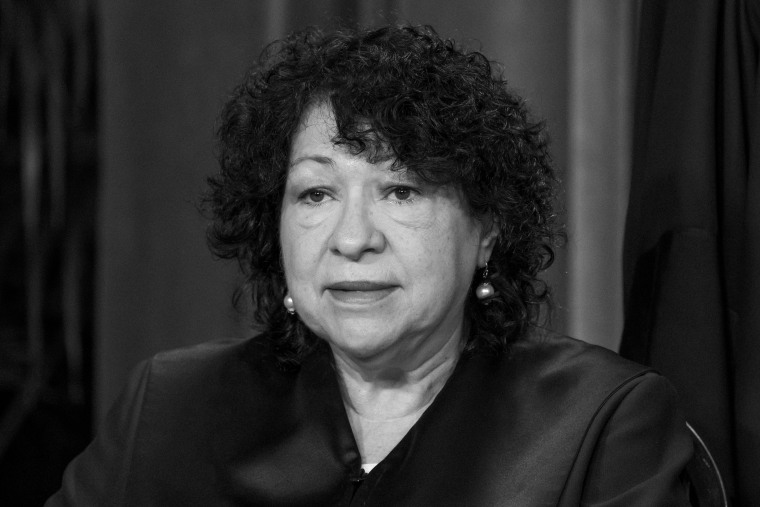Another Supreme Court ethics controversy emerged Tuesday after The Associated Press reported that Supreme Court Justice Sonia Sotomayor’s staff routinely “prodded” libraries, universities and other public institutions to buy her books ahead of speaking appearances and that she had failed to recuse herself from legal cases involving her book publisher. Given that the Supreme Court has no binding ethics code, Sotomayor, whose salary is over $285,000 a year, didn’t violate any laws. But her staff’s efforts represent a use of public resources to privately enrich an already well-paid public servant, and they wouldn’t be allowed in Congress or the executive branch.
The response from some liberal commentators has been to downplay the matter. They correctly point out that Sotomayor’s impropriety is minor in comparison to recent ethics scandals involving fellow Justices Clarence Thomas and Samuel Alito, who have been lavished with vacations and gifts from billionaire GOP activists. But a purely comparative lens distracts from the problem. Once again we’re seeing that the Supreme Court has no guardrails against exploitation of power, whether large or small, liberal justice or conservative. And that makes ethics reform at the court even more necessary.
Once again we’re seeing that the Supreme Court has no guardrails against exploitation of power.
The AP report reveals that Sotomayor’s staff encouraged venues to buy her memoir and children’s books, which have earned her nearly at least $3.7 million since she took her position on the high court in 2009. In a statement to the AP, the Supreme Court characterized Sotomayor’s involvement in cases involving her book publisher as an “inadvertent” error and said “conflict check procedures have since been changed.” But the court defended the book sales: “When she is invited to participate in a book program, Chambers staff recommends the number of books [for an organization to order] based on the size of the audience so as not to disappoint attendees who may anticipate books being available at an event.”
There are a couple of problems with that defense. First, event logistics should be the responsibility of the book publisher, not Sotomayor or her staff members (who are paid to help her serve as a justice, not peddle her books). Second, records published by the AP indicate that staffers weren’t just trying to manage audience expectations; they were trying to hawk as many books as possible. For example, for a speaking event when 550 free tickets resulted in advance purchases of 28 books, a staffer was concerned that “most of the registrants did not purchase books” and asked about “a reminder going out that people need to purchase a book at the event or bring a book to get into the signing line.” In another example, an aide worked to secure the largest possible venue for Sotomayor — something that could help make her more money through book purchases. On yet another occasion, an aide said the number of books a library had purchased in advance of an event was “definitely not enough,” prompting library staff members to push back by saying it was a book publisher and bookseller matter.
It’s unclear how much Sotomayor knew about or played a role in encouraging this kind of behavior. And it is possible other justices who have also written commercial books have had their staff members do the same thing.
But as the AP notes, staff involvement in organizing speaking events intended to sell books is “prohibited for members of Congress and the executive branch, who are barred under ethics rules from using government resources, including staff, for personal financial gain. Lower federal court judges are also instructed to not ‘lend the prestige of the judicial office to advance’ their ‘private interests.’” So why on Earth should it be allowed for the Supreme Court?
Fortunately some Democrats are trying to solve these issues. Sen. Sheldon Whitehouse of Rhode Island and Senate Judiciary Committee Chairman Dick Durbin of Illinois are leading the effort to pass the Supreme Court Ethics, Recusal, and Transparency Act, which is up for a committee vote July 20. If passed, that bill would create an enforceable code of ethical conduct for the court, improve financial disclosure standards and strengthen recusal requirements to reduce conflicts of interest. More robust rules would also discourage justices and staffers from engaging in potentially corrupt conduct.
Sotomayor’s recently revealed conduct isn’t even close to the worst of the things we’ve learned about how justices have inappropriately used their power. But an error is an error. That it’s a liberal Supreme Court justice doesn’t make me more inclined to dismiss it — it makes me less so: I expect more from people whose ideology should make them more vigilant against misuse of power. It’s a reminder that we need rules rather than blind trust to protect the public. The solution here is not to point the finger elsewhere, but to call with even more urgency for Supreme Court ethics reform through Congress.

